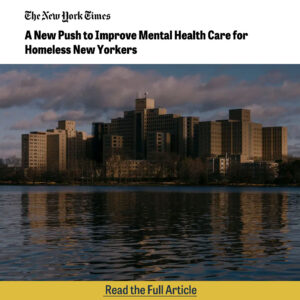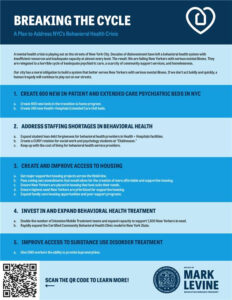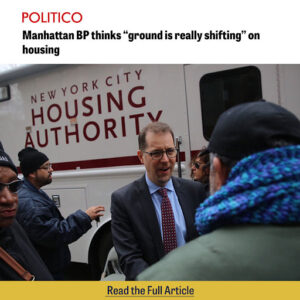A mental health crisis is playing out on the streets of New York City.
Decades of disinvestment and stigmatization have left our city’s behavioral health system with insufficient resources and inadequate capacity at almost every level.
The result: We are failing New Yorkers with serious mental illnesses, such as schizophrenia and bipolar disorder, leading to a vicious cycle that impacts not only people struggling with mental illness but also their loved ones, neighbors, and community.
Here is how the cycle plays out. People with untreated psychiatric conditions that require being admitted for in-patient care are unable to get access to a bed because Manhattan has lost a significant number of in-patient psychiatric beds.
Instead, they return to the streets when discharged prematurely.
Those who are lucky enough to get a bed and are successfully stabilized need ongoing treatment through community-based outpatient services, peer-support programs, and long-term supportive housing when they leave the hospital.
But here again, patients often run into a lack of capacity and, without care, become seriously vulnerable to falling through the cracks of our healthcare system and are likely to land back on the streets and subways.
Once out of care and facing instability, this disastrous mental health cycle plays itself out over and over again.
To help better support these New Yorkers, my office is releasing “Breaking the Cycle,” a policy initiative outlining several key recommendations to tackle the leading causes of this crisis. These include:
Adding 600+ long-term psychiatric beds
Addressing shortages of clinical staff in behavioral health
Speeding up the development of supportive housing
Expanding community-based and peer-led programs
Doubling mental health teams for street outreach
Implementing these initiatives will not be easy. Some will require significant investment and political capital.
But we cannot be deterred. No matter the price, our city has a moral obligation to build a system that better serves New Yorkers with serious mental illness.
The urgency of this issue demands immediate and decisive action. We must transform our city into a place where everyone, regardless of their mental health, has access to the necessary support and resources to live with dignity and hope.
NYC Must Lead Boldly on AI
|
|
|
|
Manhattan knows we need more housing…way more housing. With the average rent topping $5,000 a month, it’s no wonder everyday New Yorkers are demanding solutions, and fast!
We’re looking at it from all angles – identifying 171 sites borough-wide where new housing is possible, approving housing projects in the pipeline more quickly than ever, and keeping up the drumbeat for supporting new construction.
Last week, Politico profiled the BP’s efforts to make way for more housing in the borough and the overwhelmingly positive response from Manhattanites.
If you would like to read more, check out our last newsletter, in which the BP put our commitment to tackling the housing crisis front and center. Want to see more housing built? Sign our petition here.
Do you enjoy helping your community? Do you have some extra time?
Year round, the Manhattan Volunteer Corps helps out with community clean-ups, clothing drives, boroughwide events, and more. It’s a great way to give back to your fellow New Yorkers and get to know your neighbors across Manhattan.
No matter what you’re interested in or what your skills are, we’ve got a spot for you on Team Levine. We’ve got a packed schedule for 2024, so sign up now to join the Manhattan Volunteer Corps!
| Volunteer with Us |
Featured: BP’s Manhattan Composting Initiative
|
|
|
|
 NYC Public Schools kindergarten applications are open now through January 19, 2024. Kindergarten offers will be available to families on March 27. Apply and learn more about kindergarten admission here.
NYC Public Schools kindergarten applications are open now through January 19, 2024. Kindergarten offers will be available to families on March 27. Apply and learn more about kindergarten admission here.









 Volcano in Southwest Iceland Erupts Again, Raising Concerns Over Air Quality and Tourism
Volcano in Southwest Iceland Erupts Again, Raising Concerns Over Air Quality and Tourism